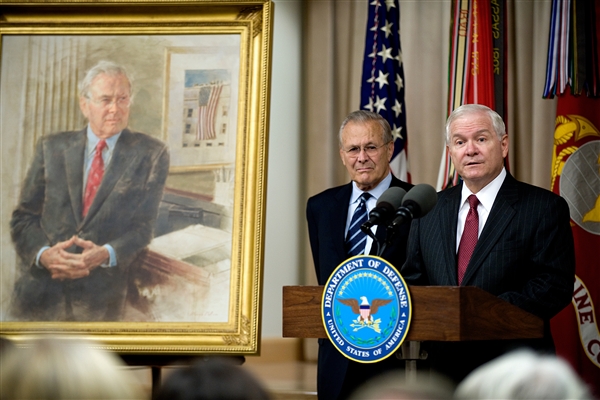ST. PETERSBURG, Russia, March 21, 2011 — In a nation he spent much of his career studying and a city he last visited at the end of the Cold War, Defense Secretary Robert M. Gates answered questions here today from Russian naval officers about the U.S. Defense Department, its problems and its future.
After delivering a speech at the new State Russian Naval Museum, Gates invited questions from his audience of mid-level officers from the Kuznetsov Naval Academy.
“The biggest threats we face are actually those where international cooperation is significantly required,” Gates said. “The first is terrorism, … and the other is the proliferation of weapons of mass destruction, particularly proliferation in states that have threatened to destroy other states.”
Terrorism sent the United States into Afghanistan and into a difficult fight with al-Qaida, he added.
Nuclear proliferation in Iran brought “all the permanent members of the U.N. Security Council — the United States, Russia, China, Great Britain, France — together to try and bring pressure to bear” on that nation, he said.
“It is certainly my hope,” the secretary added, “that none of us ever have to use military force to deal with these proliferation problems, but rather that we can persuade these countries … to give up these weapons or weapons programs voluntarily.”
One of the biggest U.S. defense problems, Gates said, involves very expensive weapons systems ordered many years ago. Some have ended up costing much more than anticipated, and others “have proven not to be useful in the 21st century,” he told the Russian officers.
The secretary said he’s made progress on the problem, saving American taxpayers $300 billion or more as a result.
“But being able to be more selective about the weapons programs that we have,” he said, “making them relevant to [tomorrow’s] challenges and getting them delivered on time and as budgeted is a challenge that every military in the world faces in the 21st century.”
The world is not going to face the kinds of threats it experienced in the 20th century, the secretary said.
“We will face a range of potential conflicts that slides along a spectrum of lethality,” he explained. “We will confront nonstate actors that potentially have the capabilities of states, whether it’s in the cyber area or in the case of Hezbollah, which has tens of thousands of rockets and missiles — more than most governments in the world.”
Perhaps the biggest national security and strategic challenge, Gates told the group, is preparing militaries for diverse threats and security challenges under limited budgets and getting the maximum possible flexibility for using those capabilities technologically and in terms of training.
Gates said the way weapons are procured is a major structural change needed in the U.S. military. Most services still buy their own weapons, he added, “but in fact a number of those capabilities can be shared among all of the services.”
“As we have learned to fight jointly and are structured jointly,” he added, “we need to learn how to buy weapons jointly.”
The secretary cited remotely piloted vehicles as an example, noting that each service has its own program for buying them. “And we think we could save a lot of money if they went together in these programs,” he said.
In a discussion of training and education for U.S. service members, Gates acknowledged repeated rotations for the wars in Iraq and Afghanistan have cut into full-spectrum training for the whole range of missions that each service is supposed to perform.
Turning to U.S.-Russian cooperation, Gates said he would like to see more effort put into an exchange program for Russian and U.S. military officers and noncommissioned officers.
“We would more than welcome exchanging students between our professional military training and education organizations and Russia’s,” Gates said. The effort would benefit both countries, he said, and he promised to raise the issue with Russian Defense Minister Anatoliy Serdyukov during a meeting tomorrow.
“It would do both of our militaries good to learn from one another and have the experience of spending time together,” he added, noting that the U.S. military services “would be very interested in this at every level, not just the most-senior officers but mid-grade officers and even noncommissioned officers.”
Source:
U.S. Department of Defense
Office of the Assistant Secretary of Defense (Public Affairs)

 von
von 